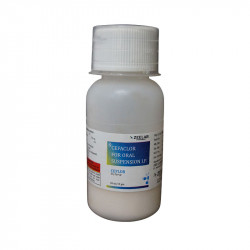Cefaclor
Cefaclor is a second-generation cephalosporin antibiotic used to treat bacterial infections. It works by stopping the growth of bacteria, making it effective against respiratory tract infections, skin infections, ear infections, and urinary tract infections. Cefaclor is available in tablet, capsule, and suspension forms, making it convenient for different age groups. It is a prescription medicine and should be taken under medical supervision to ensure proper treatment and avoid antibiotic resistance.
Uses of Cefaclor
- Treatment of pneumonia and bronchitis
- Management of bacterial sinusitis
- Treatment of skin and soft tissue infections
- Ear infections (otitis media)
- Urinary tract infections (UTIs)
- Throat infections, including strep throat
How Cefaclor Works
Cefaclor works by interfering with bacterial cell wall formation, leading to the destruction of harmful bacteria. It inhibits the synthesis of peptidoglycan, a crucial component of bacterial cell walls, ultimately killing the bacteria and stopping the infection.
Benefits of Cefaclor
- Effectively treats a wide range of bacterial infections
- Available in multiple dosage forms for easy administration
- Faster relief from infection-related symptoms
- Well-tolerated with minimal side effects
- Works against both gram-positive and gram-negative bacteria
How to Take Cefaclor
Cefaclor should be taken as prescribed by a doctor. It is usually taken orally with or without food. Swallow the tablet or capsule with water. The suspension should be shaken well before use and measured with a dosing spoon or cup. Complete the full course of antibiotics to prevent bacterial resistance.
Types of Dosage Available
- Tablets
- Capsules
- Oral suspension
Side Effects of Cefaclor
- Nausea and vomiting
- Diarrhea
- Skin rash and itching
- Headache
- Abdominal pain
- Allergic reactions (rare but serious)
Safety Advice
- Complete the full course even if symptoms improve
- Inform your doctor if you have a history of penicillin allergy
- Avoid alcohol while taking Cefaclor
- Not recommended for people with severe kidney disease without medical supervision
- Use with caution during pregnancy and breastfeeding
Frequently Asked Questions
Q: What is Cefaclor used for?
A: Cefaclor is used to treat bacterial infections, including pneumonia, bronchitis, UTIs, and skin infections.
Q: How should I take Cefaclor?
A: Take Cefaclor as prescribed by your doctor, usually with or without food. Complete the full course for best results.
Q: Can I stop taking Cefaclor if I feel better?
A: No, you should complete the full course to prevent bacterial resistance and recurrence of infection.
Q: Does Cefaclor cause diarrhea?
A: Yes, mild diarrhea is a common side effect. If it becomes severe, consult a doctor.
Q: Can I take Cefaclor if I am allergic to penicillin?
A: Inform your doctor before use, as Cefaclor is a cephalosporin and may cause allergic reactions in penicillin-sensitive individuals.
Download India's most affordable pharmacy app
- Compare with medicine prices
- Save upto 90% on your medicine bills

Temperature Controlled storage and delivery

Regular Sanitization

Disinfected Packaging















 Added!
Added!